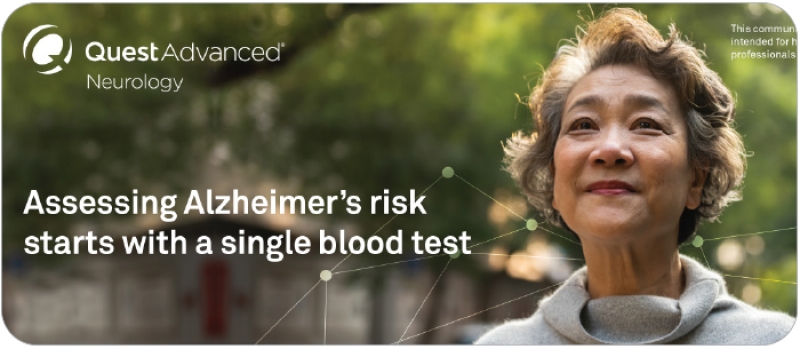Should you take the new blood test for Alzheimer's risk?
“Quest Introduces First-To-Market Consumer-Initiated Blood Test for Alzheimer’s Disease Risk Assessment on questhealth.com,” said the July press release. For $399, you can now get a blood test that didn’t need the FDA’s approval and doesn’t require a doctor’s visit. Should you?
1. What is AD-Detect?
Beta-amyloid plaques and tau tangles are the hallmarks of Alzheimer’s disease (see the latest on maintaining memory). Quest’s new test, AD-Detect, measures two beta-amyloid proteins in the blood.
And any adult who says they have “trouble remembering, concentrating, making decisions, etc.” can get it. (Quest charges a $13 “physician service fee” for one of its doctors to order the test.)
2. How well does it work?
It’s hard to say. “The test was not properly validated against what we consider the gold standard: a PET scan of the brain,” says S. Ahmad Sajjadi, chief of the Memory Disorders Division at the University of California at Irvine School of Medicine.
So far, only Quest’s summary of data on just 209 people is available. It shows a high level of false positives—that is, people who are at high risk of Alzheimer’s according to AD-Detect but not according to PET scans.
“I don’t know how much we can trust the results that people get from these tests,” says Sajjadi.

3. Many people with beta-amyloid are still sharp.
“Many people who are positive for beta-amyloid are cognitively normal,” explains Sajjadi.
“Some people die with abnormal levels and never develop memory problems.” That may apply to 30 to 40 percent of older people.
And it’s not clear why it would even help to know if you have amyloid.
“If someone without symptoms said to me, ‘I am positive for beta-amyloid, what can I do?’ my answer would be eat a healthy diet and exercise,” says Sajjadi. “But that would hold true, amyloid or not.”
On the downside, “If somebody gets an abnormal test result, it might cause psychological stress, not to mention the potential implications for getting insurance.”
4. A neurologist can help.
Other blood tests for Alzheimer’s can only be ordered by a physician.
“We’re more confident about the results for PrecivityAD2, which includes a blood test for p-tau and ApoE,” says Sajjadi.
But neither test is covered by insurance or Medicare. And neither beats a neurologist’s workup.
“I see patients who have a family history of Alzheimer’s or are noticing increased forgetfulness,” says Sajjadi.
“One of my jobs is to arrange for proper assessments or to reassure them that their forgetfulness is normal for their age.”
(Quest does offer customers a chance to discuss results with a doctor in its network.)
5. The FDA hasn’t okayed it.
Quest didn’t need FDA approval to sell AD-Detect because it’s a “lab-developed test” (LDT). The agency hasn’t required that LDTs be vetted—as it does for other “medical devices”—because of pushback from industry.
But in September, the FDA said it plans to clarify that LDTs do require vetting. (Nutrition Action’s publisher, the Center for Science in the Public Interest, led the fight for the change.)
Once that approach is phased in, LDTs will be more reliable, but many patients will likely still be interpreting results on their own.
“These direct-to-consumer tests are really worrisome,” says Sajjadi
Tags
Topics
Continue reading this article with a NutritionAction subscription
Already a subscriber? Log in
More on preventing disease
What to know about skin cancer

The link between cruciferous vegetables and cutting cancer risk

Will extra protein help lower your blood sugar if you have diabetes?

Alcohol & arthritis: Is there a link?

What can taking the stairs do for you?


